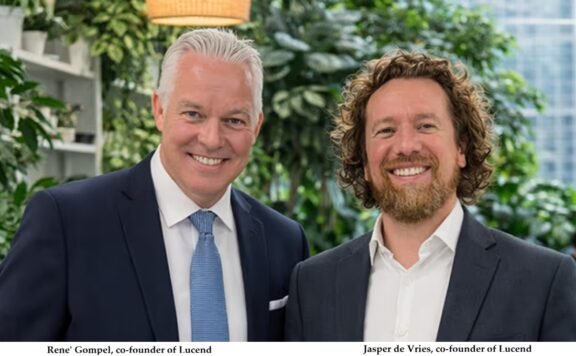Sander van Waes, CEO of Renie, redefines waste management with tech-driven smart bins, data analytics, and innovative partnerships. Renie aligns sustainability with financial incentives, transforming waste into resources while supporting UAE’s zero-waste goals.
What inspired the founding of Renie, and how has the company’s mission evolved?
The inspiration for Renie came from my experience at a previous company where sustainability was perceived as a cost centre rather than an income generator. Determined to challenge this mindset, I founded Renie – a tech company that supports waste management by enabling segregation at the source – placing consumer-facing smart bins that ensure materials are separated before reaching traditional waste management companies. Our mission has since evolved to integrate advanced technology, making recycling and sustainability accessible and financially beneficial, enabling businesses to transform waste into revenue-generating assets.
How does Renie’s tech-driven approach redefine waste management in the UAE and globally?
Renie is a technology company, not a traditional waste management firm. Its core focus lies in segregation at the source and data-driven monetization as a tech company. By integrating smart technology and advanced data analytics in its Smart Bins, Renie transforms waste into a valuable resource before it reaches waste management companies. In-house manufacturing in the UAE ensures high-quality innovation tailored to local needs while supporting the nation’s sustainability goals.
What innovative technologies or processes is Renie implementing to address waste management challenges?
Renie’s Smart Bins feature custom sensors and processors to collect and process waste-related data. This technology ensures traceability and accountability from source collection to recycling facilities. By partnering with companies like Tetra Pak and others, Renie supports large-scale recycling initiatives while driving consumer engagement and increased awareness through technology-driven waste segregation solutions.
How does Renie leverage data and AI to optimize waste collection, sorting, and recycling?
Renie’s Smart Bins utilise real-time tracking and data analysis to monitor waste collection from consumers. This tech-driven system aligns financial incentives with sustainable practices, fostering transparency and accountability. Data insights ensure effective waste segregation, optimise recycling processes, and influence consumer and business behaviours towards sustainability, delivering measurable environmental benefits.
What is Renie Rewards, and how does it incentivize users?
Renie Rewards is a core component of the company’s strategy to encourage sustainable practices. It monetises waste-related data, offering financial benefits and incentives to consumers for responsible waste segregation at the source. By financially rewarding sustainability, the programme motivates users to recycle more effectively while fostering long-term environmental responsibility.
What kind of rewards can users redeem, and how do these encourage sustainable practices?
Renie Rewards incentivises sustainable behaviour by allowing users to earn points for recycling items such as tetra packs, cans, and plastic. These points can be accumulated and redeemed for attractive rewards, including DU prepaid cards, smartphones, and other valuable incentives. Renie encourages users to actively participate in recycling efforts by providing tangible benefits and integrating sustainable practices into their daily routines. This reward system promotes environmental responsibility while encouraging a culture of sustainability by making recycling an engaging and rewarding experience for all users.
What steps is Renie taking to contribute to the UAE’s sustainability goals, such as achieving zero waste to landfill?
Renie’s tech-driven solution makes waste segregation at the source accessible and a standard practice across the UAE. By ensuring waste is separated before reaching waste management companies, Renie helps divert waste from landfills and promotes a circular economy. This approach aligns with the UAE’s zero-waste commitment and supports its Vision 2030 goals.
What educational initiatives have Renie launched to encourage sustainable waste habits among UAE residents?
Renie has launched several initiatives and campaigns to promote sustainable waste habits among UAE residents by integrating waste collection at accessible consumer points into everyday life.
- Schools: Renie installed its smart bins in over 250 schools, fostering recycling habits among students and instilling a culture of sustainability from an early stage.
- Government Collaborations: Partnering with Dubai Municipality, Renie deployed Smart Bins across government entities, collecting millions of bottles and reinforcing sustainability practices within public institutions.
- Hospitality Sector: Through a collaboration with Ajman Tourism, Renie engaged with hotels across the emirate to implement source segregation, paving the way for eco-friendly waste management in the hospitality industry.
- Residential Communities: In partnership with Ajman Municipality, Renie placed smart bins in residential towers while educating residents on the importance and ease of segregating waste at the source, creating a more sustainable urban environment.
These initiatives reflect the company’s ongoing commitment to building a sustainable future through collaboration, innovation, and community engagement.
Are there any unique partnerships or collaborations Renie has formed to drive innovation in the waste management sector?
Renie has established a unique and impactful partnership with Tetra Pak, a global leader in food processing and packaging solutions. This collaboration focuses on encouraging and increasing carton recycling across the MENA region through innovative waste stream solutions. The partnership aims to advance sustainability and promote environmentally responsible waste management practices at scale by combining Renie’s tech-driven segregation capabilities with Tetra Pak’s industry expertise.
What motivates you as the CEO of Renie, and how do you stay innovative in such a competitive sector?
The immense potential to redefine sustainability as a driver of growth and innovation is a constant source of motivation for me. At Renie, we are not just addressing today’s waste management challenges – we’re reshaping how communities and businesses perceive waste itself. The idea that small changes, like better segregation and recycling, can create positive ripple effects across industries, economies, and the planet inspires me every day.
Innovation thrives when challenges are seen as opportunities. By leveraging data-driven solutions and aligning sustainability with tangible financial benefits, I ensure Renie stays ahead of the curve. Our mission extends beyond addressing waste management issues in the UAE; we aim to set a global standard for how technology and collaboration can transform sustainability from responsibility into a universal practice, driving a cleaner, more resource-efficient future.
What trends in waste management are you most excited about on a global scale, and how is Renie positioned to capitalize on them?
Global trends such as the shift toward circular economies, advancements in waste-to-resource technologies, and the growing use of AI and data analytics in sustainability are particularly stimulating. The circular economy model, in particular, reimagines waste as a resource, creating endless opportunities for innovation and economic value.
Renie is uniquely positioned to capitalise on these trends by integrating cutting-edge technology into its consumer-facing Smart Bins. Its solutions utilise AI and real-time data analytics to streamline recycling processes, encourage waste segregation at the source, and transform waste into a monetisable asset. By making sustainability accessible, scalable, and profitable, Renie aligns with global trends and is also leading the charge in transforming waste management into a driver of both environmental and economic progress.
What advice would you give to aspiring entrepreneurs looking to make an impact in the sustainability space?
Aspiring entrepreneurs should focus on aligning sustainability with economic incentives, making eco-friendly practices accessible and compelling for businesses and consumers alike. Embrace innovation through technology—leveraging tools like data analytics, AI, and smart solutions can redefine sustainability from being seen as a responsibility to becoming a dynamic and profitable growth opportunity. Prioritise scalable solutions that address real-world challenges while generating measurable environmental and economic value. Finally, collaboration and adaptability are crucial for driving meaningful, lasting impact in the ever-evolving sustainability landscape.





